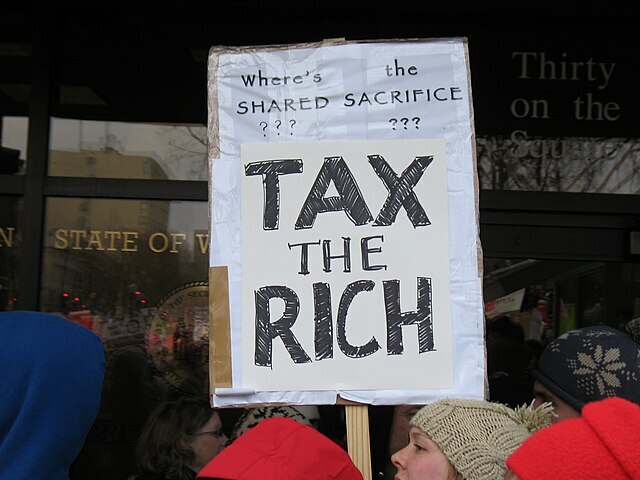The following is the transcript of a talk given on April 16, 2018 at Western Carolina University for WCU’s Center for the Study of Free Enterprise:
In any discussion of public policy, I think it is impossible to talk intelligently about questions like “good enough” or “fair enough” without asking first “by what standard?”. What is the goal? So, as I go through my thoughts on these issues, I will try to make my standards explicit, which, unfortunately, isn’t typically done, especially when it comes to questions of fairness generally and tax fairness specifically.
Good Enough?
So, in addressing the first part of this topic, that is, were the recent tax changes “good enough,” as an economist the standard that I’m going to use is one that is commonly invoked in the economics of taxation when judging any tax reform. Do the changes enhance economic efficiency? To what extent does it raise the money that it sets out to raise while minimizing the harm that all taxation, and in particular the income tax, does to economic growth and human wellbeing?
I think the answer is a guarded, yes.
The changes that are currently being made to the tax code are good in the sense that they move the tax system in the right direction, but not good enough, as the question is posed. And I think in a few cases we took some steps backward.
There were changes that should have been made that weren’t and changes that were made that didn’t go far enough, and at least in a couple of instances, should not have been made at all.
Let’s start with an important fact. The income tax, by its very nature, is harmful to economic growth. So long as we are going to continue to have an income tax, the best we can do is structure that tax, so the economic damage minimized.
So why do I say that the income tax is, by its very nature, harmful to economic growth?
Many years ago, early in my career, while I was at the Institute for Research on the Economics of Taxation in Washington, D.C., I worked for someone who I think was one of the finest tax economists of the 20th century. His name was Dr. Norman Ture and at the time was President of the Institute for Research on the Economics of Taxation, and my boss. He is widely recognized as the original architect of Ronald Reagan’s 1981 tax cuts. Anyway, Norman had a very important saying that he would repeat over and over again, which was “people aren’t taxed, activities are.” What he meant by that is that all taxes penalize some activities relative to others. Cigarette taxes penalize smoking. Alcohol taxes penalize the consumption of wine, beer, and spirits. So, what kind activities do the income penalize? Obviously, it penalizes income generating activity relative to non-income generating activity—work relative to leisure and saving, investment, and entrepreneurship relative to consumption. In a market-based economy income generating activity is economic growth generating activity. Therefore, the income tax penalizes economic growth.
So how did the recent reforms fare in terms of reducing this penalty on work, saving, investment, and entrepreneurship? Good but not good enough—although, from a political perspective it was probably as good as could be expected.
The Good
Under the category of good, there are three very important improvements to the tax code. First is the reduction of the corporate income tax from 35 percent, one of the very highest in the world, to 21 percent, which is much more competitive internationally. But I wish they were able to bring the rate down even more. And it is not just because of the penalty against corporate investment that the tax represents. Personally, I think the corporate income tax should be abolished. It is a dishonest tax in that corporations, as legal entities, do not pay taxes, people pay taxes. Every dollar of corporate income tax must come out of some person’s pocket. The people who pay the corporate tax are consumers in the form of higher prices, workers in the form of lower wages and shareholders—in many cases pensioners and IRA and 401K holders–in the form of smaller dividends and capital gains. This fact is obscured by what is misrepresented as a tax on corporations. In a democracy, taxes need to be visible and obvious to those who pay them. Informed voters need to be aware of how much government is costing them.
The second very important change that I want to highlight is the movement from using depreciation schedules for deducting capital investments like plant and equipment, which basically means deducting investments over time—to a system of expensing, which means deducting the investment all at once in the year that it is made. In the question and answer period I’ll be happy to get into the logic of this, but let me just assert right now that it makes complete sense from an economics perspective to do this.
The third change under the category of “good” is the reduction of personal rates across the board. While the first two changes reduce the tax penalty on investment and entrepreneurship, this third change reduces the tax penalty on work effort relative to leisure. It makes work more rewarding by simply allowing people to keep more of what they earn.
There are other aspects of the law that I like, for example, the changes to the estate tax, but I just don’t have time to discuss them here.
The Not as Good as they Could Have Been
There are a couple of things I want to put under this heading. The first is that two of the changes I just talked about are temporary. The move to expensing expires in five years. That just doesn’t make economic sense. It needs to be made permanent.
In addition, the personal income tax rate reductions expire after 10 years. So, in a sense, we have a major tax increase that will go into effect after 10 years, built into the system.
I would also like to have seen the estate tax eliminated as was done in North Carolina in 2013.
And thirdly, under this category, I would have liked to have seen something done with capital gains taxes. Cap gains taxes represent a double or even a triple tax on investment and savings. And because they are not adjusted for inflation, an investor could actually be taxed on real capital losses. So, I think the rates could have reduced rates or gains could have been adjusted for inflation. But none of this was done. That’s a disappointment.
The Bad
Finally, the bad; I don’t see any economic justification for capping the deduction for state and local taxes. As far as I can tell there is nothing about that that reduces the penalty on income generating activities or economic growth. And to the extent that it generates an additional transfer of wealth from the private sector to government control, it harms economic growth.
Also, there is a host of work-related expenses that are no longer deductible. Moving expenses, cost of uniforms, dues for professional organizations. Some commuting costs. These are costs related to earning one’s income and should be deductible. By eliminating these deductions, the tax penalty against work is increased.
Fair Enough?
So let’s move on to what many might think is the more interesting part of this discussion—the fairness question. And while I do have some opinions about this issue, it is the area that I am probably the least qualified to talk about. I’m not an ethicist or a moral philosopher. But we at the John Locke Foundation, as analysts of state tax policy and as supporters of the tax reform that was put in place in our own state back in 2013, which came under fire as being “unfair,” have found ourselves in the position of having to seriously think about the question of tax fairness. After all, John Locke was a moral philosopher, and as such, I think that we have found ourselves searching for and ultimately finding and endorsing what can rightfully be called a Lockean position on the question.
Interestingly enough, we find a pretty sound, “Lockean,” standard by which to judge the fairness or justness of these recent tax reforms and tax policy more generally in Article 1, Section 1 of the North Carolina Constitution. And what it says should sound mostly quite familiar:
We hold it to be self-evident that all persons are created equal; that they are endowed by their Creator with certain inalienable rights; that among these are life, liberty, the enjoyment of the fruits of their own labor, and the pursuit of happiness.
As I said, this should sound familiar except for one point made explicit in the N.C. Constitution that is not found in the Declaration of Independence—that all people have a creator-endowed right to the enjoyment of the fruits of their own labor. And what are the fruits of one’s own labor? They are his or her income.
So, this points directly to a theory of tax fairness or tax justice. Taxation, by its nature, denies people the right to a portion of their income, i.e., the fruits of their labor. So, the relative fairness or justness of any tax reform can be judged by the extent to which it moves in the direction of allowing people keep and use as they see fit, the fruits of the labor—their income.
So, I think in this regard the latest tax changes fare pretty well, i.e., they’re good, but they’re not good enough.
By all reports, and I don’t think we really know for sure yet, and won’t until people file their taxes next year, about 80 percent of American taxpayers will be getting a tax cut from these changes, that is they will be allowed to keep a larger portion of the fruits of their labor. But that means 20 percent won’t be allowed to keep more of the fruits of the labor, and some of those will be able to keep even less—most of these people are in higher tax states where many will be losing deductions for state and local taxes (SALT).
By the way, I think the loss of these SALT deductions are themselves an injustice. In other words, state and local governments through taxation reduce people’s rights to their income and then the federal government comes along and places a tax on that portion of their income that their state and local governments have denied them their rights to. To place taxes on taxes simply compounds the injustice.
The final point I want to make is that recent tax reform has maintained a steeply progressive rate structure. So, while rates in all income categories have been cut the reforms maintained seven different income categories with seven different rates.
I want to argue that progressivity in the rate structure is inherently unfair, that is if you accept the standard of fairness that I have laid out here, which argues that people are endowed by their creator with equal rights to the fruits of their labor. In other words, embedded into that statement is a notion of equality under the law. Progressivity violates this principle. It is based on an opposite premise, namely that people with higher incomes have fewer rights to the fruits of their labor than do people with lower incomes. So, from the perspective of tax fairness, clearly, it would have been an improvement if they moved in the direction of fewer brackets and ultimately a single rate—that is a flat tax.


